Trump: A permanent shutdown is "not a viable long-term strategy" for the US
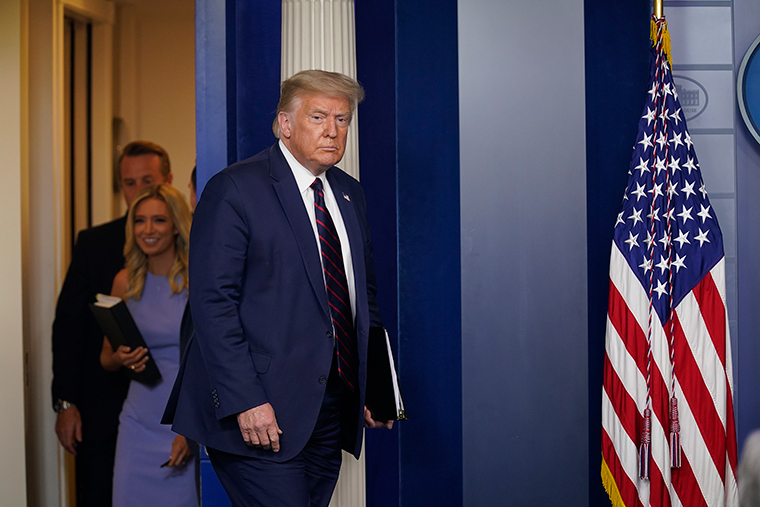 Evan Vucci/AP
Evan Vucci/APPresident Trump said shutting down the economy "to achieve a temporary reduction in cases is certainly not a viable long-term strategy for any country" as coronavirus continues to spread across the country.
"The scientific path forward is to protect those at highest risk while allowing those at lower risk to carefully return to work and to school with appropriate precautions," he said at a news briefing on Thursday.
"A permanent shutdown would no longer be the answer at all," he added.
He said the purpose of the shutdown was to flatten the curve and to develop treatments and therapies.
"We have done that," Trump said, but warned the virus "can come rearing back when you least suspect it."
Trump said moving forward, it is important to protect elderly people and those with health conditions that put them at higher risk for complications.
"You want to protect the elderly and socially distance. Wear a mask if you cannot socially distance and practice vigorous hygiene. Everyone – even healthy young people – should be taking extraordinary care to avoid infecting those at the highest risk from this terrible disease," he said.
Watch here:
Trump pays his respect to Herman Cain who died from Covid-19
From CNN's Nikki Carvajal
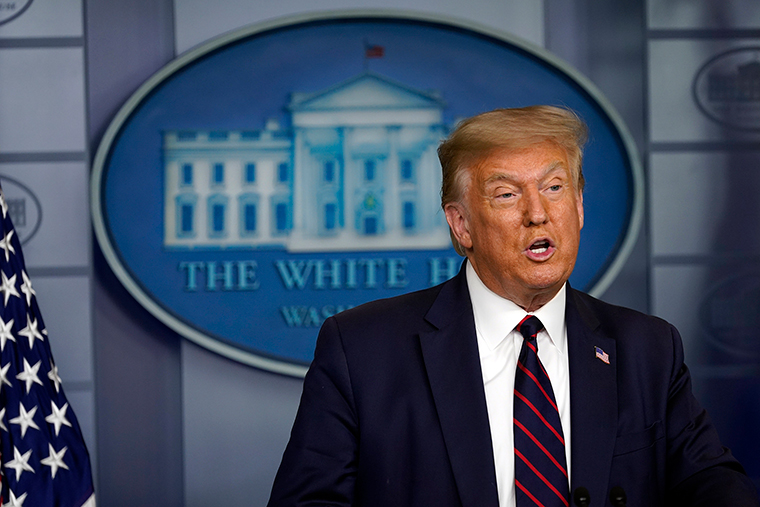 Evan Vucci/AP
Evan Vucci/APPresident Trump expressed his sadness over the death of Herman Cain, who passed away from Covid-19 after spending nearly a month in the hospital with the virus.
Trump sent prayers to Cain’s wife and “wonderful family.”
Earlier Thursday: Trump tweeted that he had spoken with the Cain family.
“America grieves for all of the 150,000 Americans who had their lives taken by this horrible invisible enemy,” Trump said. “We mourn their loss as a nation, we mourn their loss as people, as people that love one another.”
The head of vaccine effort is "optimistic" vaccines will be available for everybody within the year 2021
From CNN’s Elizabeth Cohen
The head of Operation Warp Speed said he’s “optimistic” there will be vaccines for all Americans by the end of next year, but hopefully even sooner.
“I am optimistic that we will have vaccines for everybody within the year 2021, ideally within the first half of the year 2021. That's our objective,” said Moncef Slaoui, chief adviser to the federal government’s multi-billion-dollar program to develop a Covid-19 vaccine.
In his first television interview since being appointed, Slaoui spoke with CNN Senior Medical Correspondent Elizabeth Cohen on Thursday while touring a vaccine clinical trial site in Savannah, Georgia.
Phase 3 clinical trials – the final step before government approval – are underway in the United States for two vaccines, one made by Moderna and another by Pfizer. Operation Warp Speed is also funding six other vaccine efforts, Slaoui said.
Slaoui said he expects to “probably have a few tens of millions of doses [of vaccine] in December and January” and those would go to high-risk individuals.
“We will not have doses for the full US population on day one,” he said.
High-risk individuals include the elderly and those with underlying health conditions such as hypertension, diabetes and cardiovascular disease.
There is no "cost-benefit ratio of letting people sit in bars" until there is a vaccine, Bill Gates says
From CNN's Naomi Thomas
Bill Gates, co-chair of the Bill and Melinda Gates Foundation, said schools should be opened up if infection rates get very low, but he can’t see a benefit to reopening bars and restaurants.
Speaking during a Time 100 Talk on Thursday, Gates said that it was a good thing that, in many of the initial hotspots, such as New York City, the numbers were down dramatically.
For bars and restaurants, however, Gates said that until there is a vaccine, “sadly, I just can’t see the cost-benefit ratio of letting people sit in bars” due to the amount of transmission that has come out of them, from people talking loudly and being close to each other.
“We haven’t been as tasteful as we might like to be,” he said, and the country is now paying a price for some places that reopened despite an increase in Covid-19 cases.
Later this year: Autumn could be a challenge because people will be indoors more. Cold and flu symptoms could make things a bit more confusing, Gates said.
“So, if we can use the next few months to get the numbers down, that will make a huge difference in terms of the death going into the fall,” said Gates.
He described the fall as a mix where “the innovation track is the good news that could bring things down, and a lack of social distancing – you know – that one hangs in the balance.”
Just 2 weeks of social distancing reduced coronavirus spread by 65% globally, study finds
From CNN's Maggie Fox
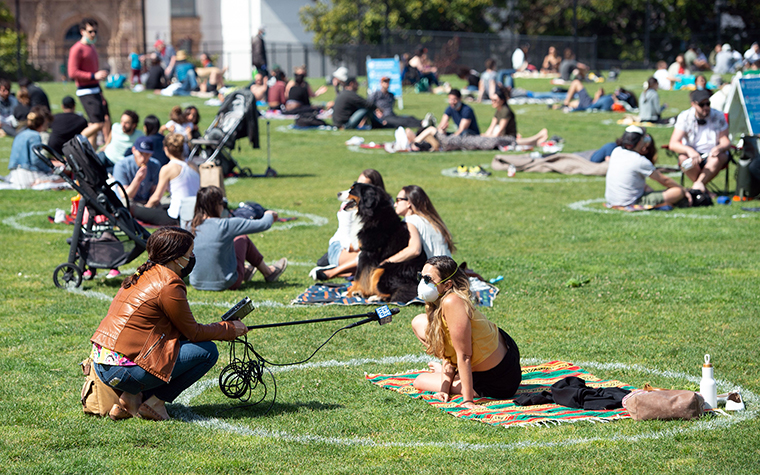 A woman is interviewed from inside a painted circle on the grass encouraging social distancing at Dolores Park in San Francisco, California on May 22, amid the novel coronavirus pandemic. Josh Edelson/AFP/Getty Images/FILE
A woman is interviewed from inside a painted circle on the grass encouraging social distancing at Dolores Park in San Francisco, California on May 22, amid the novel coronavirus pandemic. Josh Edelson/AFP/Getty Images/FILEJust two weeks of social distancing policies cut the spread of coronavirus by 65% globally, preventing more than 1.5 million new cases, Texas researchers estimated Thursday.
The few states and countries that resisted social distancing saw almost no reduction in spread, the team at the University of Texas MD Anderson Cancer Center said.
More details: The team set out to see what happened when states enacted social distancing or lockdown policies at the start of the coronavirus pandemic.
The team compared Nebraska and Idaho, two similar states. Idaho had a social distancing policy, while Nebraska did not.
South Dakota, whose governor also resisted a statewide policy, also saw little to no reduction in cases. Wyoming lacked a social distancing policy and the sparsely populated state came in fifteenth from the bottom out of 50 states in terms of reducing coronavirus spread.
But the study was lacking in data, the researchers said.
“While analysis of US states indicated that social distancing policies reduced Covid-19 spread rates proportional to associated reductions in mobility, only having three states without social distancing policies reduces the power of any observation,” they wrote. "To address this, we next expanded our model to the global level.”
They looked at data from 134 different countries.
"Globally, we find that social distancing policies significantly reduced the Covid-19 spread rate, with resulting in an estimated 65% reduction in new Covid-19 cases over a two week time period,” the researchers wrote.
In 46 countries, the policies had a strong effect, preventing an estimated 1.57 million cases of Covid-19 over a two-week period. That represents a 65% reduction in new cases, they said.
Social distancing is not necessarily the only way to reduce spread, they noted.
“For instance, South Korea has not enacted a social distancing program but instead utilized a powerful contact tracing approach to control the spread of Covid-19,” they wrote.
Watch:
Primary election in Milwaukee didn't result in an increase of Covid-19 cases, CDC report says
From CNN's Gisela Crespo
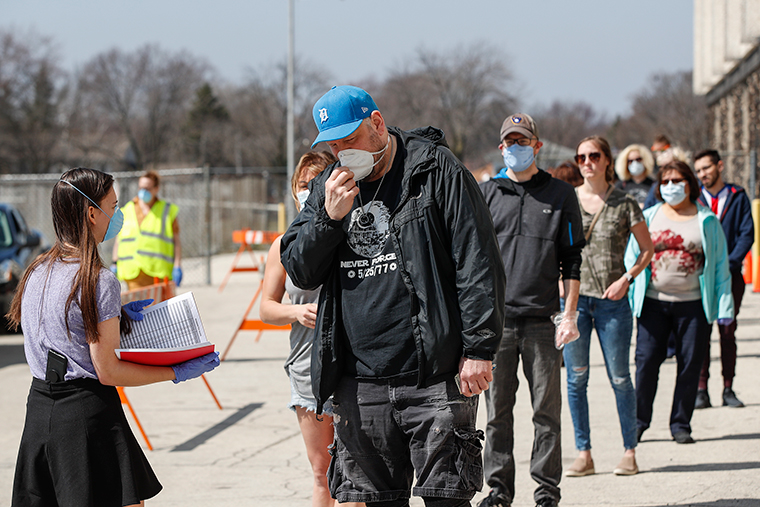 People wait in line to vote in a Democratic presidential primary election outside the Hamilton High School in Milwaukee, Wisconsin, on April 7. Kamil Krzacznski/AFP/Getty Images/FILE
People wait in line to vote in a Democratic presidential primary election outside the Hamilton High School in Milwaukee, Wisconsin, on April 7. Kamil Krzacznski/AFP/Getty Images/FILEThere wasn't a clear increase in Covid-19 cases, hospitalizations or deaths in Milwaukee after statewide primary elections in Wisconsin this spring, according to a US Centers for Disease Control and Prevention report published Thursday.
Researchers studied data on Covid-19 cases in Milwaukee from March 13 to May 5 to determine if there was an increase in the virus stemming from Election Day on April 7. The findings appear in the CDC’s Morbidity and Mortality Weekly Report.
As most people develop Covid-19 symptoms two to 14 days after exposure, the report looked at cases during the expected incubation period of April 9 to April 21.
What the report found:
Wisconsin was the first state to hold an election that included in-person voting after stay-at-home orders went into effect March 25 to slow the spread of the virus.
The report said these trends were likely influenced by a relatively lower turnout of voters compared to the same time in 2016.
Here were some of the voting trends:
The report says these findings show CDC's interim guidelines "encouraging physical distancing, personal prevention practices, and employing environmental cleaning and disinfection lower COVID-19 transmission risk during elections," the report said.
The risk can be reduced even more, it says, “by fully implementing CDC interim guidance, which recommends longer voting periods, and other options such as increasing the number of polling locations to reduce the number of voters who congregate indoors in polling locations.”
Louisiana has highest number of coronavirus cases per capita in the nation
From CNN’s Jennifer Henderson
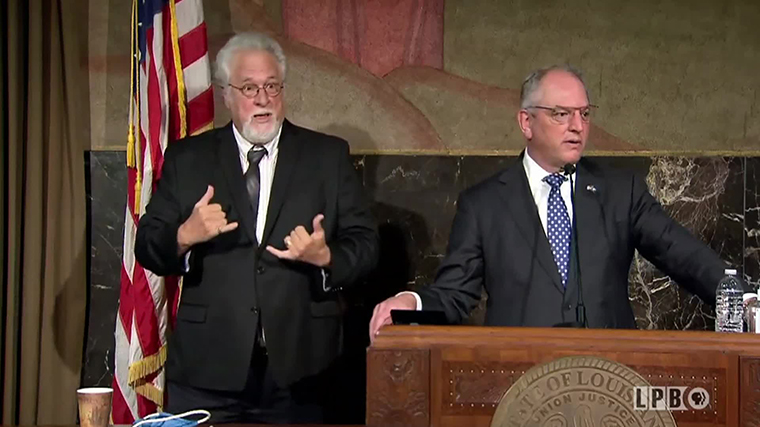 Gov. John Bel Edwards Louisiana Public Broadcasting
Gov. John Bel Edwards Louisiana Public BroadcastingLouisiana has the highest number of Covid-19 cases per capita in the nation — more than Arizona, Florida, New York and others, Gov. John Bel Edwards said in a news conference today.
Louisiana has reported 1,769 new Covid-19 cases for a total of 114,000. The state has also reported 42 new deaths for a total of 3,811 from the virus.
On Thursday, Louisiana had 69 deaths, which was the largest number of deaths in a 24-hour period in two and a half months, Edwards added.
Louisiana has about 38,000 known active Covid-19 cases, Edwards said, but that does not count the 25% to 40% of people with Covid-19 that are asymptomatic.
Note: These numbers were released by Louisiana Gov. John Bel Edwards and may not line up exactly in real time with CNN’s database drawn from Johns Hopkins University and the Covid Tracking Project.
SEC to play conference-only football schedule in the fall, commissioner announces
The Southeastern Conference announced teams will play conference games in the fall, according to a statement on Twitter.
The new football season will kick off on Sept. 26 "to allow its universities to focus on the healthy return of their campus communities and the gradual re-introduction of athletics," SEC Commissioner Greg Sankey said Thursday.
The season will be made up of a 10-game, conference-only schedule. The SEC Football Championship Game will be played on December 19 in Atlanta – pushed back from its original date of Dec. 5, the SEC said.
Sankey said a conference-only schedule gives teams the ability to make adjustments throughout the season depending on the state of the virus.
"We believe these schedule adjustments offer the best opportunity to complete a full season by giving us the ability to adapt to the fluid nature of the virus and the flexibility to adjust schedules as necessary if disruptions occur," Sankey said in the statement.
Sankey said a revised schedule will be announced after it is approved by athletic directors in the conference.
"Further decisions regarding safety standards related to athletics events, tailgating and other game day activities, including social distancing, face covering and other health measures consistent with CDC, state and local guidelines" will also be announced at a later date, the statement said.
Some context: Sankey said 14 members of the SEC are continuing "to monitor developments related to COVID-19."
Read the tweet:
Other countries beat the US in setting up strong models of Covid-19 response, Bill Gates says
From CNN’s Naomi Thomas
While the US has historically led the way when it comes to things like smallpox, polio and HIV, other countries were off the mark faster with a coronavirus response, Microsoft founder Bill Gates said Thursday.
A number of countries, which he did not name, got going a lot quicker than the US, said Gates, whose Bill & Melinda Gates Foundation funds multiple health care initiatives. Countries with previous experience fighting SARS or MERS were the quickest and set up strong models, Gates said in a Time 100 talk.
For instance, testing has been slow, Gates said.
“The US is now starting, you know, to say hey, the testing turnaround can’t be long like this,” he said. “We need to be more prudent in not having things like bars and restaurants open,” he added.
Gates also said that he doubted many people would be able to name an official at the US Centers for Disease Control and Prevention, which has been kept behind the scenes. But he was glad National Institute of Allergy and Infectious Diseases Director Dr. Anthony Fauci was speaking prominently.

 5 years ago
536
5 years ago
536 

